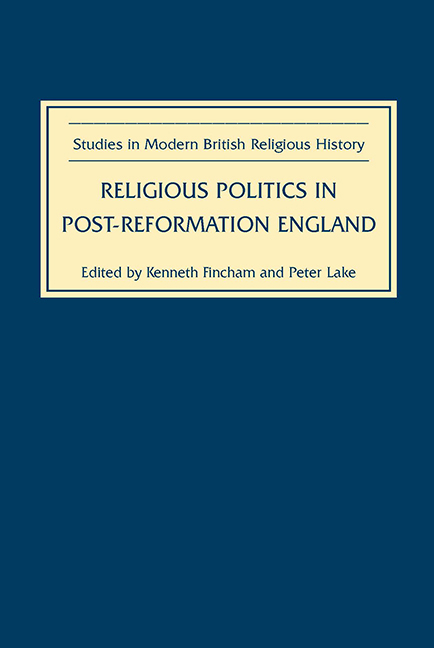Book contents
- Frontmatter
- CONTENTS
- Dedicaton
- Miscellaneous Frontmatter
- Preface
- Abbreviations
- 1 Introduction: Puritanism, Arminianism and Nicholas Tyacke
- 2 Art and Iconoclasm in Early Modern England
- 3 The Latitude of the Church of England
- 4 Joan of Contention: The Myth of the Female Pope in Early Modern England
- 5 Anti-Puritanism: The Structure of a Prejudice
- 6 The Fortunes of English Puritanism: An Elizabethan Perspective
- 7 What's in a Name? Dudley Fenner and the Peculiarities of Puritan Nomenclature
- 8 Puritan Preachers and their Patrons
- 9 New England's Reformation: ‘Wee shall be as a Citty upon a Hill, the Eies of All People are upon Us’
- 10 ‘Anglicanism’ by Stealth: The Career and Influence of John Overall
- 11 Destroyed for doing my Duty: Thomas Felton and the Penal Laws under Elizabeth and James I
- 12 Charles I and Providence
- 13 John Shawe and Edward Bowles: Civic Preachers at Peace and War
- 14 Material Evidence: The Religious Legacy of the Interregnum at St George Tombland, Norwich
- Index
- Tabula Gratulatoria
- Studies in Modern British Religious History
1 - Introduction: Puritanism, Arminianism and Nicholas Tyacke
Published online by Cambridge University Press: 25 October 2017
- Frontmatter
- CONTENTS
- Dedicaton
- Miscellaneous Frontmatter
- Preface
- Abbreviations
- 1 Introduction: Puritanism, Arminianism and Nicholas Tyacke
- 2 Art and Iconoclasm in Early Modern England
- 3 The Latitude of the Church of England
- 4 Joan of Contention: The Myth of the Female Pope in Early Modern England
- 5 Anti-Puritanism: The Structure of a Prejudice
- 6 The Fortunes of English Puritanism: An Elizabethan Perspective
- 7 What's in a Name? Dudley Fenner and the Peculiarities of Puritan Nomenclature
- 8 Puritan Preachers and their Patrons
- 9 New England's Reformation: ‘Wee shall be as a Citty upon a Hill, the Eies of All People are upon Us’
- 10 ‘Anglicanism’ by Stealth: The Career and Influence of John Overall
- 11 Destroyed for doing my Duty: Thomas Felton and the Penal Laws under Elizabeth and James I
- 12 Charles I and Providence
- 13 John Shawe and Edward Bowles: Civic Preachers at Peace and War
- 14 Material Evidence: The Religious Legacy of the Interregnum at St George Tombland, Norwich
- Index
- Tabula Gratulatoria
- Studies in Modern British Religious History
Summary
Characterizing the nature and significance of the work of Nicholas Tyacke is, on the one hand, extremely easy. Scarcely can one interpretation have had such an influence on a major area of historical research as Tyacke's thesis, article and subsequent monograph on the rise of Arminianism. On the other, precisely because of the impact of that initial thesis, and the considerable body of subsequent research and controversy that it provoked, it is all too easy not only to lose sight of the very distinguished corpus of work on other themes that Tyacke has produced, but also to collapse his very considerable contribution to the field into an often crudely rendered, even caricatured, version of the initial thesis.
However, having said that, we still have to start with that article, published in 1973 in a volume of essays edited by Conrad Russell. Tyacke's piece ‘Puritanism, Arminianism and Counter-Revolution’ had an immediate impact, attracting the attention of many reviewers, and passing with remarkable speed into the textbook orthodoxy of the ensuing decades. The collection of essays in which it appeared, The Origins of the Civil War, is often, in many ways rightly, regarded as the first coherent statement of the position that quickly came to be known as revisionism. As many of its early champions took great pleasure in pointing out, revisionism was an insurgent movement, designed not merely to modify but in effect to invert the current orthodoxies of the day. Tyacke's article was no exception to that rule. It was launched against an historiography that was still in many ways wedded to the notion of a revolutionary puritan movement, and to some sort of bi-polar divide between an Anglican establishment and a puritan opposition. This was the religious equivalent of the face-off between crown and commons that was, in many ways, the organizing theme for the dominant narratives of the politics of the period between 1559 and the 1640s. Tyacke's argument inverted that claim. Defining puritanism as essentially a political movement for ecclesiastical change, Tyacke argued that in the central years of James's reign puritanism was, if not dead, then certainly dormant, incorporated into a Calvinist consensus, a basic agreement about the central soteriological doctrines centred on predestination that bound the majority of English protestants together, and served as an ‘ameliorating bond’ linking erstwhile puritans even to some of the most aggressive proponents of the ecclesiastical status quo.
- Type
- Chapter
- Information
- Religious Politics in Post-Reformation England , pp. 1 - 15Publisher: Boydell & BrewerPrint publication year: 2006

